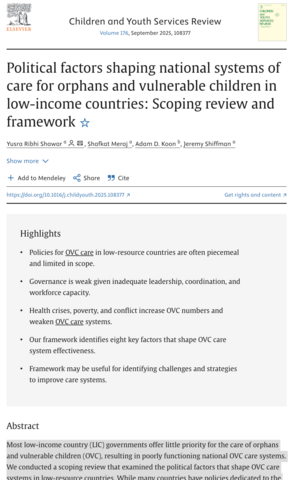Most low-income country (LIC) governments offer little priority for the care of orphans and vulnerable children (OVC), resulting in poorly functioning national OVC care systems. This study conducted a scoping review that examined the political factors that shape OVC care systems in low-resource countries. While many countries have policies dedicated to the care of OVC, national policies for OVC care are unduly influenced by external actors, lack overarching policy frameworks, are vague, and/or are limited in scope. Also, many national OVC care systems receive little political commitment, lack strong leadership, are highly fragmented in nature, and are reliant on workforces with limited capacity. Societal problems, such as a high AIDS burden and chronic poverty, have weakened kinship care and left many children vulnerable. Based on the findings, we developed a framework grounded in social science theory, which delineates eight key factors that likely shape the effectiveness of OVC care systems in LIC, organized according to three categories: policymaking, governance, and context. Policymaking refers to the content and production of national legislation, regulations and strategies for OVC care. Governance refers to the quality of collective action on OVC care. Context pertains to the socioeconomic and political environment in which OVC care systems are situated, and that shapes both the problems and the effectiveness of these systems. The framework offers a starting point for guiding research, identifying systems deficiencies, and developing strategies to surmount these deficiencies.

